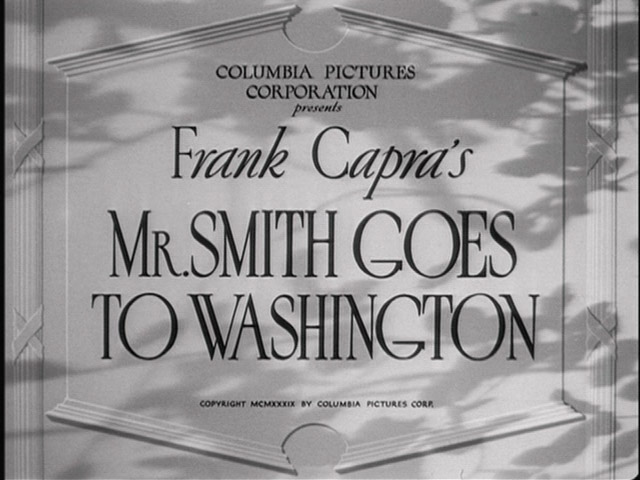
Confession time: I've never seen a Frank Capra film before tonight. Yes, that means I've never seen It's a Wonderful Life, so I totally don't know whether or not George Bailey kills himself or what. But despite not seeing any Capra, I had a strong idea of what Capra was known for: baldfaced moralizing, big lessons. I don't mean that in a bad way -- I know he's loved and respected, but I also know he's famous for moralizing and lessons. What I didn't know before tonight is that he's also fantastic at simple characterizations and complex relationships, and while he does tend (in Mr. Smith at least) to beat you over the head with his point as though you were a dead horse, he also offers a point that's nuanced and complicated. Sure, the good guys are really, really good, and the bad guys are pretty dang awful, but the situation isn't easy and the solution -- well, the actual solution isn't easy. More on that in a moment.
Mr. Smith moves along at a great clip, two nonstop hours of humor and heartwarmingness, and like I say it's got some really fine moments, just tiny things (Smith and his hat; the piggy congressman stuck in the phone booth; Diz and Saunders drunk) that sell you on his people, make you kind of love them. It isn't afraid to be funny every chance it gets, and I think Capra knows that's the sugar that makes his medicine easy to swallow -- but what's more is, he lays out a complicated, interesting, concise world, and that's what (for my money) makes his medicine worth swallowing. Even when Smith is filibustering, totally and unequivocably and 10,000% on the side of Goodness, he is portrayed as cut-off, detached from the citizens he cares so much about. And they from him; they depend on the media to have any idea what's really happening in Washington, and for various reasons throughout the story (often greed-related reasons, but occasionally for more sly motives like sensationalism or good old mocking the suspicious new guy) the media is shown to be scandalous, inaccurate, or downright deceptive. There is the citizenry and there is the government and the bridge between them is a rickety and fallible one, and no solution to that dilemma is offered in the story here.
The "solution" to corruption in the Senate -- the attempted suicide and then berserker-confession of Senator Payne (the brilliant Claude Rains) -- which I admit is well-motivated, still feels rushed, thrown in last-minute, as if they were in a hurry to wrap things up and give Jeff Smith his victory. Still, I don't think Capra really believed that guilty senators held the key to the real life problems he was suggesting, and so not despite but because of his movie's easy, last-minute resolution, he makes the open question of what should be done about the problems he portrays all the more apparent. We can't guilt our dirty politicians into killing themselves or throwing themselves on the mercy of the Senate floor... So what do we do?
It's 70 years later. We still don't have an answer.

No comments:
Post a Comment